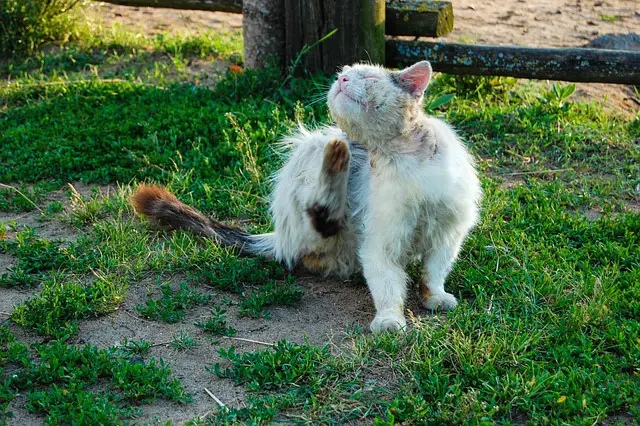For many people, cats and fleas go hand in hand. But do farm cats have fleas? The answer is yes. While flea infestations are more common in cats that live indoors, it’s still possible for an outdoor cat to get fleas. Here’s what you need to know about flea infestations in farm cats and how you can keep your pet safe from these pesky parasites.
Do farm cats have fleas?
Fleas are too common for cats living inside and outside the home, including farm cats.
It’s not uncommon for outdoor cats to pick up fleas, ticks, and other parasites while out and about in their environment, so it stands to reason that farm cats may also have fleas.
The best way to determine if a cat has fleas is to schedule a visit with your veterinarian. During the appointment, your vet can inspect the cat’s fur and skin to look for flea dirt or other signs of fleas.
Additionally, your vet may recommend preventative steps or treatments if necessary. It is recommended that farm cats be kept up-to-date on flea prevention measures to ensure they remain parasite free.
Flea Biology
Fleas are tiny insects that feed on the blood of their hosts.
They lay their eggs on the fur of animals or in their bedding and other areas of the home where the animals spend most of their time.
The eggs then hatch into larvae, which eventually become pupae before hatching into adult fleas.
Flea Prevention for Farm Cats
If you have a farm cat, there are several steps you can take to help prevent them from getting fleas.
- First, keep your cat up to date with their vaccinations, as this will help protect them from any diseases they may come into contact with while out roaming around the farm grounds.
- Second, regularly groom your cat with a comb or brush to remove any loose fur and debris that might be harboring eggs or larvae.
- Thirdly, keep your property clean by removing all potential hiding spots, such as piles of leaves or wood chips – this will reduce the chances of your cat coming into contact with adult fleas.
- Finally, use products specifically designed for outdoor cats, like spot-on treatments or collars that repel fleas and ticks – these can provide an extra layer of protection against pests when used correctly and regularly.
Conclusion
Fleas can be a nuisance for both indoor and outdoor cats alike. It’s essential to be aware that farm cats are just as vulnerable to developing a flea infestation as any other type of feline companion – even if they stay most of the time outdoors.
By keeping up with regular grooming sessions and using products specifically designed for outdoor cats – like spot-on treatments or collars – you can help reduce the chances of your pet coming into contact with these pesky parasites! If all else fails, don’t hesitate to contact a veterinarian who can provide treatment options tailored to your farm cat’s needs.
[su_box title=”Affiliate Disclosure”]This website is supported by its readers. Please assume that all links are affiliate links. If you make a purchase from one of the links we will make a commission from Amazon. Thank you.[/su_box]




